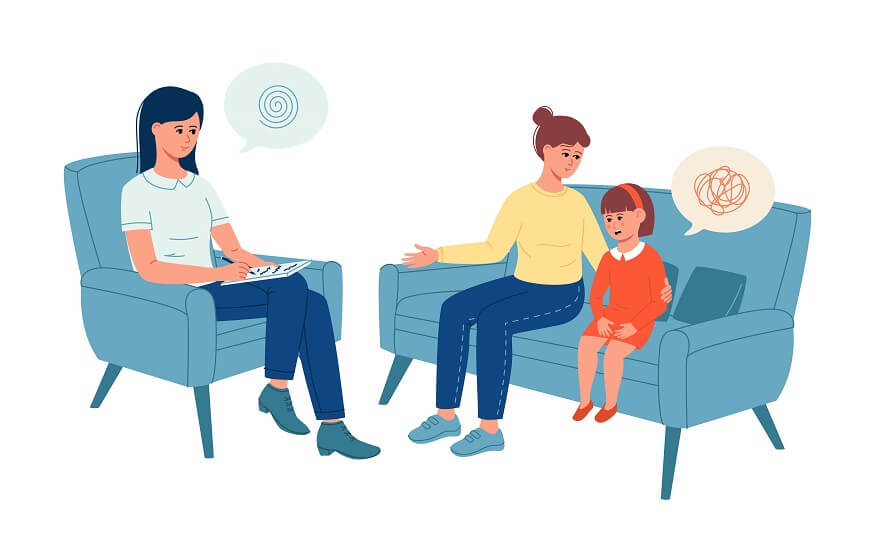In particular when it comes to their mental health, as parents, we prioritise our kids’ well-being. Finding the best paediatric psychologist for your child may seem challenging if they are having issues that call for their help. We’ll guide you through the process of selecting the finest child psychologist. You can make an informed choice that supports your child’s emo by considering aspects like specialisation, experience, evidence-based approaches and techniques, assessment and evaluation methods, confidentiality and privacy policies, parental support and involvement, progress monitoring and evaluation, cultural sensitivity and diversity, referrals and collaborative networks, cost and insurance coverage, emergency and crisis support, and long-term treatment planning.
Also Read: Top 7 Instruments in Music Therapy for Kids
1. Specialisation in Child Psychology
When choosing a child psychologist, it’s crucial to seek one with specialised knowledge and training in child psychology. Look for professionals who have expertise in dealing with children’s specific mental health concerns and developmental stages. They will understand the unique challenges children face and tailor their therapeutic approach accordingly. Specialisation in child psychology ensures that the psychologist has an in-depth understanding of child development, age-appropriate interventions, and evidence-based practices that are effective for children.
2. Experience Working with Children
Consider the experience of a child’s therapist in working with children. Inquire about their experience, the variety of ages of the kids they’ve treated, and the kinds of problems they’ve overcome. An experienced paediatric psychologist is more likely to have dealt with a range of circumstances, making it easier for them to comprehend and support your child’s particular requirements. Their knowledge of children’s developmental phases and behavioural patterns has deepened because of their practical experience. An experienced paediatric psychologist is skilled at developing rapport and gaining children’s trust, both of which are necessary for effective therapy.
3. Evidence-Based Approaches and Techniques
Inquire about the psychologist’s preferred therapeutic approaches and techniques. Look for experts that use practices that have been shown successful by scientific study and are supported by evidence. For mental health disorders in children, some methods have undergone thorough investigation and have been found to be successful. Psychologists may work with your kid to enhance their mental health, change unhealthy thought patterns, and learn coping mechanisms by using evidence-based strategies.
4. Assessment and Evaluation Methods
Ask the pediatric psychologist about their assessment and evaluation methods. A thorough evaluation is crucial to understanding your child’s strengths, challenges, and underlying factors contributing to their difficulties. Psychologists should utilise standardised assessments, clinical interviews, and observation to gather comprehensive information and tailor treatment plans accordingly. These evaluations provide valuable insights into your child’s areas of strength and areas that require attention. Based on these assessments, the psychologist can develop a personalised treatment plan that targets your child’s specific needs.
5. Confidentiality and Privacy Policies
When considering a child’s therapist, it’s important to discuss confidentiality and privacy policies. Find out how they maintain confidentiality, share information, and the limits to confidentiality. Make sure they follow ethical guidelines and prioritise safeguarding your child’s personal information. Child therapist should explain their confidentiality policies clearly, including situations where they might need to breach confidentiality, such as if there’s a risk of harm to the child or others. Knowing their privacy is protected helps your child feel more comfortable and open during therapy.
Also Read: What Is Learning Disability? 8 Career Options for Students with Learning Disabilities
6. Parental Support and Involvement
Choose psychologists who value and encourage parental support and involvement. Effective therapy involves working together with parents to reinforce therapeutic strategies at home. Ask how they include parents in the treatment process, provide guidance, and offer resources for supporting your child’s progress outside of therapy sessions. Parental involvement is crucial for successful therapy. They can guide parents in supporting their child’s growth, reinforcing therapy techniques, and creating a supportive home environment that complements the progress made in therapy.
7. Progress Monitoring and Evaluation
Ask the child therapist how they monitor and evaluate your child’s progress. Regular assessment and monitoring help gauge the effectiveness of the treatment plan. Psychologists should establish goals, track progress, and communicate with you regarding your child’s advancements, making necessary adjustments to the treatment plan as needed. Monitoring and evaluating progress are essential components of therapy. By regularly assessing your child’s progress, psychologists can ensure that the treatment is effective and adjust strategies if necessary. This ongoing evaluation and feedback process allows for continuous improvement and maximises the positive outcomes for your child.
8. Cultural Sensitivity and Diversity
Consider a psychologist’s cultural sensitivity and commitment to diversity. It is essential that they understand and respect your child’s cultural background and individual identity. A culturally sensitive psychologist will be more capable of providing a safe and inclusive environment for your child, promoting their overall well-being. Cultural sensitivity involves recognizing and valuing the unique cultural experiences and backgrounds of your child. A culturally sensitive psychologist will adapt their therapeutic approach to consider cultural nuances, beliefs, and practices that may influence your child’s mental health. They will create a welcoming and affirming space where your child feels understood and respected.
9. Referrals and Collaborative Networks
Ask about a psychologist’s referrals and collaborations. A well-connected child psychologist can recommend other specialists if needed. Collaboration ensures comprehensive care for complex challenges. Psychologists with networks can tap into expertise and resources for your child’s mental health needs. They can refer to psychiatrists, occupational therapists, or speech therapists if necessary. Working with a team enhances the quality of care and addresses your child’s needs comprehensively.
10. Consider the cost of therapy and insurance coverage.
Discuss fees, session duration, and payment options with potential psychologists. Ask if they accept insurance or offer sliding scale fees based on income. Understanding the financial aspects upfront helps you plan for long-term therapy. Costs vary based on experience, location, and session duration. Clarify fees, including assessments or specialised services. If you have insurance, ask about coverage for mental health services. Some psychologists offer sliding scale fees or flexible payment plans. Openly discussing costs ensures therapy remains accessible and affordable.
11. Inquire about emergency support.
Ask about availability during urgent situations and their protocol for handling emergencies. Clear instructions on reaching them and guidance for managing crises show their commitment to your child’s well-being. Having a responsive psychologist during critical times gives peace of mind as a parent.
12. Discuss long-term treatment planning.
Understand their approach to duration, session frequency, and milestones. A child therapist who values long-term planning provides consistent support. Collaborate on setting goals and adjusting strategies as your child’s needs evolve. Long-term planning ensures continuity of care and supports sustained progress.
Also Read: Planning Skills to Teach to Your Children
Conclusion
Choosing the right child psychologist involves considering specialisation, experience, evidence-based approaches, assessment methods, confidentiality, parental involvement, progress monitoring, cultural sensitivity, referrals, cost and insurance coverage, emergency support, and long-term treatment planning. Find a skilled and compassionate child therapist who supports your child’s growth and development. The right psychologist is an investment in your child’s future, promoting their overall happiness and success.
When it comes to choosing the right psychologist for your child, Euroschool recommends considering a few essential factors. Additionally, seek a child psychologist who utilises evidence-based approaches and techniques, ensuring your child receives effective and validated treatment. Lastly, consider the psychologist’s ability to collaborate with parents and provide support beyond therapy sessions. By keeping these factors in mind, Euroschool believes you can make an informed decision that supports your child’s mental well-being and growth.










